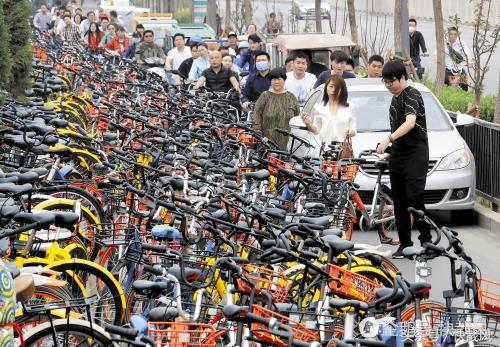I have a confession to make – I hate Mobike. To be fair, I hate Ofo too, probably even more, because I end up using them more often. This feeling has been building for some time.
It’s not like I hate the idea of bike-sharing. No decent person is against that. Fewer cabs, fewer cars, better for the environment, cheaper – everyone wins. Except for the fact that everyone is actually losing. People use them, that’s for sure. Chinese people use Mobike as if they had never known a world without it. It cuts across demographics – the young, the old – and across use cases. The original idea may have been to solve the “last mile” problem, but I’ve seen couples on dates and grannies getting groceries. Heck I’ve even seen people in sports gear using them to do laps around Century Park. Nonetheless, I still hate them.
 Once upon a time I was “into” bikes. I had seven of them, each different, and an entire room in my apartment for them. Now that I have a baby, all my stuff has either been thrown out or moved to the hallway. But I still have a vague recollection of what a proper bicycle experience should be and Mobike ain’t it.
Once upon a time I was “into” bikes. I had seven of them, each different, and an entire room in my apartment for them. Now that I have a baby, all my stuff has either been thrown out or moved to the hallway. But I still have a vague recollection of what a proper bicycle experience should be and Mobike ain’t it.
One recent evening I scanned 7 bikes in a row only to find each one had a fatal problem. One was missing a chain. One the lock wouldn’t open even though I heard the clicking sound. Seven times, seven different problems. But even when they do work, almost all provide a sub-par riding experience. Either the brake disc has been set too close to the tire which makes riding feel like wading through quicksand, or a pedal is jammed at an angle into the crank so you feel like a clown at the circus, or a tire is warped so you end up ka-thunking down the street. There’s almost always something wrong.
Which is puzzling considering these are basically brand new bikes. Since I don’t see people wantonly abusing the bikes out there (except for me), I can only assume these bikes suffer from poor construction and the natural attrition of the Shanghai elements. How was this not brought up during planning phase? “So what happens when the bikes all break down?” asks junior engineer. “The app! We’ll incentivize users to report broken bikes via the app! The app will solve everything!” answers VP of Strategy. But it doesn’t work that way in the real world. You’d have to pay people 50 kuai to get them to accurately report the exact nature of bike debilitation. Instead they just shrug and walk to the next one.
Side note – why are the options for reporting bike problems so maddeningly specific? There should be two options 1) rideable but kinda fucked and 2) totally fucked.
I hate the app almost as much as the bikes. I hate the fact that 1 out of every 5 times, the scan doesn’t work, giving me some bullshit reason which me and the bike both know isn’t true. And then there’s the maddening splash page I have to deal with even to get to the scan. People who want to ride a bike instead of walk that last mile are either a) incredibly lazy or b) want to save time and neither type wants to pause for a sham “national bike month” advert to load.
And then there is the incredible power suck the app performs on your phone battery. It used to be that Mobike only offered two settings – “Always On” and “Never On”. A few months ago they finally rolled out the “Only When Using App” option, which Ofo always had. Most of us don’t even realize they can toggle this, though, and end up with it open all the time. Bike sharing apps chew through your battery power.
Another thing that annoys me: Mobike is, like, so hot right now. As I write this hundreds if not thousands of marketing departments in Shanghai are in cloistered in meetings where someone invariably suggests that they should co-brand an event with Mobike which is met with unanimous agreement. And when a new Mobike co-branded thingy pops up, everyone says, “Sooooo coooool” and shares it into their work Wechat group. It beggars the imagination why brands would want to associate themselves with a fleet of crappy, ugly, borderline unrideable bikes that are made for the poor and the lazy. It’s like partnering with the city bus system.
I do not disagree that the above examples are small things in the grand scheme. But isn’t that exactly what causes the most rage? Because we have nothing important left to really get angry about, we end up getting angry about things because they aren’t as efficient as they should be or they fail to live up to the hype. That’s modernity. But there are bigger considerations at work here as well, things larger than me or you. There’s the city we live in and how it is rapidly being overrun by these glorified pieces of future landfill. Let me paint you a picture.
 Every afternoon around 6pm at the Loushanguan Lu Metro station there is chaos. A Maginot line of shared bikes has accumulated around the entrance to the metro. Invariably a channel or two has been carved through it which allows access, but only for a trickle of people. This in turn causes a crowd to form stretching back to the nearest bus stop where it combines with those people thereby effectively strangling off the entire sidewalk. This pushes people into the street which affects the cars thus causing gridlock. Then drivers lay on their horns and suddenly from modern annoyance we’ve tumbled directly into Winston Smith’s Room 101.
Every afternoon around 6pm at the Loushanguan Lu Metro station there is chaos. A Maginot line of shared bikes has accumulated around the entrance to the metro. Invariably a channel or two has been carved through it which allows access, but only for a trickle of people. This in turn causes a crowd to form stretching back to the nearest bus stop where it combines with those people thereby effectively strangling off the entire sidewalk. This pushes people into the street which affects the cars thus causing gridlock. Then drivers lay on their horns and suddenly from modern annoyance we’ve tumbled directly into Winston Smith’s Room 101.
This is not just Loushanguan Lu, this is all across the city.
Mobike and Ofo realize this is potentially catastrophic to their business model and have taken countermeasures, mainly consisting of hiring an army of temporary workers to try to organize this multicoloured mess into some sort of civilized order. They even dispatch large vans to the scene for workers to load up extra bikes and haul them away. Of course parking a van right next to subway entrance at rush hour mucks things up even worse, but no one except me seems to understand this.
Which brings me to my final point: Mobike is failed government. Let me explain.
The idea of shared bikes is not new. City governments have been trying to get this off the ground for years as a public service not unlike trash collection or the above-mentioned bus system. The first bike sharing program launched in 1965! They quietly existed for the next 5 decades until a year and a half ago when we got not one, not two, but half a dozen bike sharing start-ups conjured from thin air by venture capital.
Is it really beyond the capacity of the public sector to make an app, a prototype bike and a logistics pipeline? The government digs vast tunnels under the city through which whiz at carefully timed intervals metal boxes rammed with humans, but they can’t manufacture a shitty bike with a GPS chip in it? Actually I’m almost 100% sure the app part was the real deal-breaker. Has a government anywhere in the world ever managed to make an app that is worth anything? Maybe in northern Europe, but nowhere else. Every time I see a Mobike, I am reminded that collectively we can’t solve our own problems anymore.
But was the last-mile problem really a “problem” in the first place? I for one never heard anyone complain about the fact they had to walk a kilometre to get somewhere. Complaining about traffic, yes. Complaining about the metro, sure. Never heard anyone rant about not having a bike within 10 meters at all times. Mobike doesn’t so much solve a problem as displace it slightly.
And that’s why, even though we tell ourselves that we are benefiting from this wonderful new feature of contemporary life, we are actually losing. What’s the biggest resource Mobike consumes, the one that makes it possible for it to be a unicorn? Public space. If Mobike were charged a fee for each square meter of sidewalk consumed by its bikes, its ceiling would be a lot lower. In fact, it would be just another unsexy utility, like buses or mail delivery.
Why shouldn’t they be charged? Public space is not allocated on a first-come first serve basis. You can’t just set up a kitchen anywhere you see a patch of ground and start slinging jianbing or throw down a mat and start selling trinkets, not anymore at least. So while the small-time operators get chased from the sidewalks by the local chengguan while we silently nod in agreement, VC-backed bike sharing destroys huge chunks of public space and we get excited about it. It’s a choice the government makes, but was anyone really consulted?
 And that brings me to this New York Times article which went around a couple of weeks ago, “As Bike Sharing Brings Out Bad Manners, China Asks What’s Wrong with Us?” The article posits two things:
And that brings me to this New York Times article which went around a couple of weeks ago, “As Bike Sharing Brings Out Bad Manners, China Asks What’s Wrong with Us?” The article posits two things:
- Bike sharing has unleashed a surge of bad behaviour by ordinary Chinese people
- This bad behaviour has set off a wave of soul searching among Chinese people
This is the kind of shoddy, deadline-fueled thinking that the New York Times often tries to pawn off as good journalism. I’ll start with point number 2 – I don’t know any Chinese person who is searching his or her soul over potential failures in it revealed by bike sharing. Not one.
The first point is more interesting. Here are some examples of the “bad behaviour” cited by the article:
“Riders abandon bicycles haphazardly along streets and public squares, snarling traffic and cluttering sidewalks. Thieves have taken them by the tens of thousands, for personal use or selling them for parts. Angry and mischievous vandals hang them in trees, bury them in construction sites and throw them into lakes and rivers.”
I want to say something here. First, the vast majority of people are not hanging bikes from trees. Most people are pretty much playing ball with shared bikes. Those few that aren’t? I understand them. I like them. These are my kind of people. You don’t go through the trouble of hanging a bike in a tree because of “lack of decorum” or “social decay” as the Times article suggests. That takes real effort. It’s push back. It’s a reminder that public space doesn’t belong to venture capitalists. It’s a message that people will always fight back in the only way they can in China – with creative non-cooperation – which has a long and admirable tradition here.
Let’s take back the sidewalks, people. Who’s with me?


Nice one! Couldn’t agree more. As someone who commutes by bike (can’t use MoBike or Ofo because they are horrible on my knee with a recent injury) this is a problem but let’s be honest traffic and the disregard and lack of self-preservation and utter disrespect for other breathing lifeforms on the street makes me even more angry and I can’t help it. It’s not good for my blood pressure.
‘”You can’t just set up a kitchen anywhere “.
I’m not sure the author is even living in China, haven’t heard about street food vendors?
“I for one never heard anyone complain about the fact they had to walk a kilometer to get somewhere”
Maybe because you live in a closed compound with the rich expat where everyone has a personal driver. EVERYONE complains about the last km problem. I’ve never heard of someone saying “oh I’d rather walk 15min from the metro station to my apartment instead of riding a bike for 5min.
Get your head out of your ass
Everytime I see a splash page my pulse rises with anger and frustration, and in the long term, I’ll die earlier. 6 months earlier into the grave thanks to f6cking splash pages being deliberately put in places to stop me completing the task I’m urgently trying to do. Maybe there is a door out of hell, but each time you reach for the handle, a splash page advertising a Hong bao from the devil appears.
I don’t agree with mobikes being a bad thing necessarily, but I love this blog, awesome writing!
Big fan of your blog Lee. A lot of legitimate points about shared bikes here. Quality is definitely an issue. Although as a regular mobike user I have never been even close to seven attempts to find a serviceable bike. I sometimes have to abandon the bike I am on after only realising its not working properly after riding it, and find another. Perhaps as a serious cyclist you have a better idea than most people of how a bike should ride and an understandably lower tolerance level of problems with individual bikes not riding well enough.
That said, your point is well made – the quality of these bikes is only going to go down as time goes on. Ofo in particular are really cheaply constructed and they feel like you should just dump it next to a bin once you are finished with it. Mobike are a bit more solid. And yes there are often minor problems like brakes being out of alignment or not working properly, warped wheels, or the handle bars being squint.
However, shared bikes are not going to, and should not, go away any time soon. Their huge benefit to the society and the environment are obvious.
I think the problem ultimately has to be solved by city planners who need to take into account changing patterns of how people get from A to B. If we were to go back 25 years ago to the streets of Shanghai I think there would not be less bikes around than they are now and everyone got by just fine then. Seems the real issue is parking space and there’s ample space for cars already so either create more for bikes or take away parking spaces to encourage people to use polluting cars less often. Car ownership in Shanghai is about face and there’s little excuse not to at least use the city’s excellent public transport system instead. Shared bikes can make a big contribution to this in the final 1km problem, and if they become better quality, they can make an even bigger contribution by becoming a viable option for longer journeys as well.
You don’t hear many people complain about private cars being parked everywhere, yet they do about public bikes. Therein lies the issue.